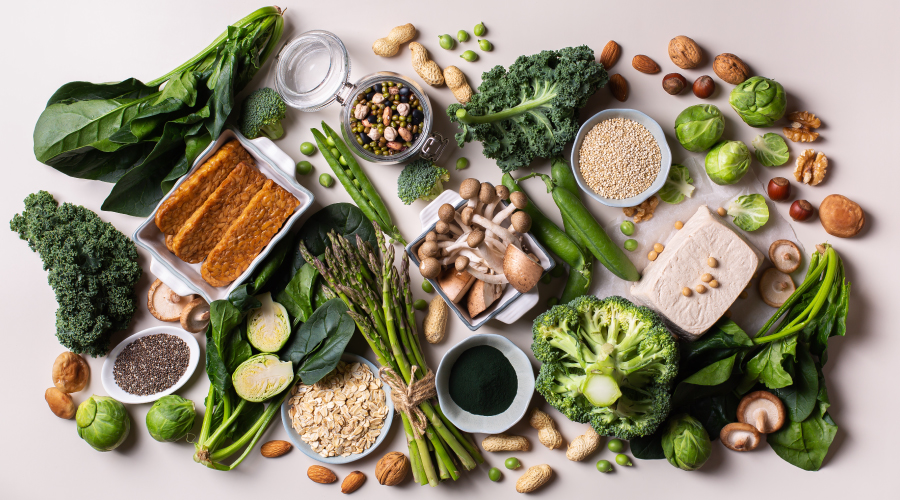In the realm of vegetarian nutrition, finding high-protein foods that not only support dietary needs but also enhance overall health can be a fulfilling journey. Whether you’re pursuing a vegetarian diet for ethical, health, or environmental reasons, ensuring adequate protein intake is crucial for maintaining muscle mass, supporting immune function, and promoting overall well-being. Here, we delve into a variety of nutrient-dense, protein-rich foods that can power your health journey.
Legumes: The Protein Powerhouses
1. Lentils
Lentils are a staple in many vegetarian diets, offering approximately 18 grams of protein per cooked cup. Beyond their protein content, lentils are rich in fiber, folate, iron, and other essential nutrients. Their versatility allows them to be incorporated into soups, stews, salads, and even veggie burgers, making them a go-to option for protein seekers.
2. Chickpeas
Chickpeas, also known as garbanzo beans, provide about 15 grams of protein per cooked cup. These nutrient-packed legumes are not only a source of protein but also offer fiber, folate, manganese, and other vitamins and minerals. Whether roasted for a crunchy snack, blended into creamy hummus, or tossed into salads and curries, chickpeas are a versatile addition to any vegetarian’s pantry.
3. Black Beans
Black beans boast around 15 grams of protein per cooked cup and are renowned for their fiber content, aiding in digestion and promoting satiety. These beans are rich in antioxidants, potassium, and folate, contributing to heart health and overall vitality. Enjoy black beans in burritos, soups, salads, or as a flavorful side dish.
Nuts and Seeds: Compact Sources of Plant-Based Protein
1. Almonds
Almonds are not only a convenient snack but also pack a protein punch with approximately 6 grams of protein per ounce (about 23 almonds). Additionally, they provide healthy fats, vitamin E, magnesium, and fiber, supporting heart health and enhancing overall nutrient intake. Enjoy almonds as a standalone snack, or sprinkle them over yogurt, salads, or oatmeal for added crunch and nutrition.
2. Chia Seeds
Chia seeds are a nutritional powerhouse, offering approximately 4 grams of protein per two tablespoons. These tiny seeds are also rich in omega-3 fatty acids, fiber, calcium, and antioxidants, contributing to heart health, digestion, and inflammation reduction. Add chia seeds to smoothies, yogurt, overnight oats, or create a refreshing chia pudding for a nutrient-packed snack or meal.
3. Pumpkin Seeds
Pumpkin seeds provide around 7 grams of protein per ounce and are rich in essential minerals such as zinc, magnesium, and iron. These seeds also offer antioxidant properties and promote prostate health. Enjoy pumpkin seeds as a crunchy snack, sprinkle them over salads or soups, or incorporate them into homemade granola for a flavorful and nutritious boost.
Dairy and Dairy Alternatives: Protein-Rich Options
1. Greek Yogurt
Greek yogurt stands out as a protein-rich dairy option, offering approximately 10 grams of protein per 100 grams. It also contains probiotics, beneficial for gut health, and provides calcium, contributing to bone health. Enjoy Greek yogurt with fresh fruits, honey, or nuts as a satisfying breakfast or snack option.
2. Cottage Cheese
Cottage cheese provides about 11 grams of protein per 100 grams and is low in fat while being rich in calcium and vitamin B12. This dairy option supports muscle repair and growth, making it an excellent post-workout snack when paired with fruits or vegetables.
3. Soy Milk
Soy milk is a plant-based alternative to dairy milk, offering approximately 7 grams of protein per cup. It is fortified with essential nutrients such as calcium, vitamin D, and vitamin B12, making it a nutritious choice for individuals following a vegetarian or vegan lifestyle. Incorporate soy milk into smoothies, coffee, cereal, or use it in baking and cooking as a versatile dairy substitute.
Grains: Wholesome Sources of Protein
1. Quinoa
Quinoa is a complete protein, containing all nine essential amino acids, and provides about 8 grams of protein per cooked cup. Additionally, it is rich in fiber, magnesium, iron, and antioxidants, supporting digestion, energy production, and overall health. Use quinoa as a base for salads, buddha bowls, or as a nutritious alternative to rice or pasta.
2. Farro
Farro offers approximately 8 grams of protein per cooked cup and is packed with fiber, magnesium, and iron. This ancient grain provides sustained energy, promotes digestion, and supports heart health. Incorporate farro into soups, salads, or use it as a hearty side dish to complement vegetarian entrees.
Vegetables: Unexpected Sources of Protein
1. Edamame
Edamame, or young soybeans, provide approximately 17 grams of protein per cooked cup, making them one of the richest plant-based sources of protein. These beans are also rich in fiber, antioxidants, and vitamins, supporting muscle repair, reducing inflammation, and enhancing overall health. Enjoy edamame as a snack, add them to salads, stir-fries, or use them as a protein-packed topping for soups.
2. Spinach
Spinach offers around 5 grams of protein per cooked cup and is rich in vitamins A, C, and K, as well as iron and calcium. This leafy green vegetable supports vision health, immune function, and bone strength. Incorporate spinach into salads, smoothies, soups, or sauté it as a nutritious side dish or ingredient in vegetarian entrees.

